
How and where you store your medication has an impact of its ability to help you get better. Follow these timeless tips to stay healthy and safe.
Most medication, whether prescription or over the counter, should be stored in a cool, dry place. Heat and moisture can impact its effectiveness and safety. Though convenient, the bathroom medicine cabinet isn’t the best place for storage because that room tends to be damp and warm. Medication should also be kept away from kitchen cabinets/counters that heat up from a stove or under-cabinet lighting. Likewise, never leave it in a hot car for more than a few minutes.
Keep medicine in its original container with labels intact. Since some medications look alike, this will remind you (and others) of what the medication and dosage is, who prescribed it and for whom, and when the expiration date is. Transporting it in the original container is also important when travelling for identification in the event of a medical emergency or when going through security lines.
Always read the package insert for storage instructions. Some medications are adversely affected by exposure to light so will need to be kept in a dark place. Others need to be refrigerated. In the latter case, be sure the lid is on tight (if applicable) to minimize absorption of moisture, and keep on a high shelf in the fridge if children might have access to it.
Remove the cotton plug that comes in some medication containers and throw it out. This can absorb both moisture and germs once the container is opened.
Store medication in a secure place, even in a locked container if necessary. This will make it inaccessible to children (including teenagers), pets and anyone else who might intentionally or accidentally ingest or misuse it.
If you get medication delivered by mail, use overnight shipping if possible. Sitting in a hot mailbox or out on a freezing porch for a few hours can change the composition of the drug and render it unsafe or ineffective, not to mention subject to thievery. If someone is not home to bring the package in when it arrives, arrange for someone else to pick it up and properly store it for you until you can retrieve it.
Additional tips:
Keep the phone numbers of your local pharmacy, poison control center and healthcare provider handy in case of accidental overdose or misuse.
When traveling, always keep prescription medication on your person and not in checked luggage or hotel rooms if possible. Bring extra doses along in the event of unexpected delays to your return home.
Dispose of medication that is past the expiration date, has changed in color or appearance, or that you or a loved one no longer take. But don’t flush it down the toilet unless specifically advised to do so by a healthcare provider or package instructions. And don’t toss it in the trash in its original container with label. With pills, it is usually best to mix them with something unpalatable such as coffee grinds or kitty litter and seal in a plastic bag before placing in the trash. You can also check with your local pharmacist or your town recycling and trash removal service about the best way to dispose of medications.
©Donna Cardillo. All rights reserved.
